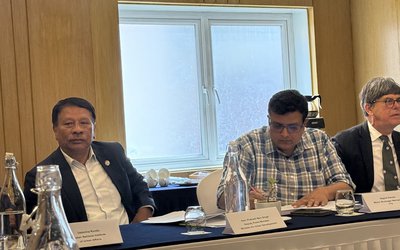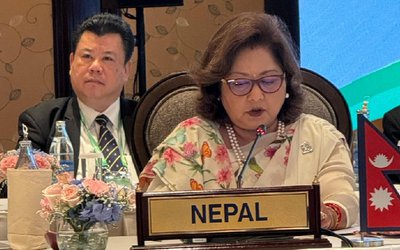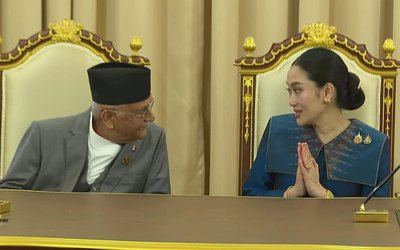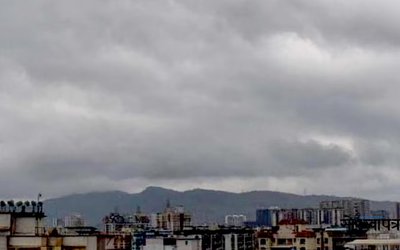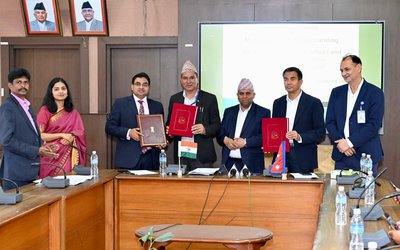
Softening their previous stance, leaders of the left alliance gave a positive signal to Prime Minister Deuba to fix the temporary provincial capital and appoint governors of the provinces, which is deemed necessary to pave way for the creation of the new government in line with the fresh election mandate. This change of position is much appreciated because the UML’s previous stance of not letting their elected representatives take the oath of office from Deuba-appointed governors had made many to believe that another serious political stalemate was in the offing. The political maturity shown by the concerned led to the appointment of seven provincial governors and naming of temporary headquarters.Following the announcement of headquarters, violent protests took place at several places in the country but fortunately did not continue for long to obstruct activities that needed to be carried out urgently in each state. It would be unwise to blame the protesters to have the provincial headquarters at a place of their choice because this is normal and very much expected because, at several points in the country, people had launched protest programmes, demanding their hometowns be declared provincial capitals of the seven provinces, weeks before the formal announcement. It is encouraging that as a result of a cessation of protests, members of the seven provincial assemblies were administered an oath of office and secrecy at the respective temporary headquarters of the seven states. With these, the centralized system of governance has come to an end and the three-tiers of government-central, provincial and local- have come into existence. While the local governments have been elected months ago, the recent completion of elections the provincial assemblies and the federal parliament have paved way for setting up two other governments. Let us hope unlike what is apprehended by the proponents of the centralized system of governance or the federal skeptics, the new system adopted does good to the nation and its people.
The Election Commission (EC) has announced a date for the election to the National Assembly (NA) and parties, mainly weaker ones, struggled to work out strategies for placement in the NA. The left alliance has decided to contest 43 seats-UML 29 and CPN-Maoist Center 14.A total of 83 candidates filed their nomination for the NA election to be held on February 7. With 17 candidates elected unopposed, 66 candidates will compete for the remaining 43 seats. The formal process of government formation is expected to start after coming into existence of the federal parliament consisting of NA and the lower house of the parliament. Despite these positive political developments which are bound to be very helpful in moving the nation towards political stability, a lot still remains to be clarified both at intra and inter-party level.UML has expressed its serious reservations about the way the incumbent government is making decisions, despite repeated urging not to take decisions which have a long-term impact. Even ordinary people have begun to find some of the decisions of this government with far-reaching consequences very difficult to digest, let alone the leaders of left parties. Decisions of this dispensation such as declaring dozens of people, who lost their lives in tragic incidents that took place decades and years ago, martyrs, reducing the age for receiving the elderly allowance to 65, likely to cost additional Rs.1.5 billion per month, voluntary retirement scheme for civil servants, likely to cost Rs. 60 billion, and an additional Rs.100,000 in housing grant to all earthquake-affected households said to add extra liability of Rs100 billion, have drawn sharp remarks from UML chair Oli who has threatened to revoke all decisions of this caretaker government.Deuba must have thought that these kinds of populist measures would make some political capital for NC and that UML, which has historically remained at the forefront of making populist announcements, would not be in a position to oppose the decisions publicly, fearing public backlash. This time around, however, UML leadership decided to stop Deuba who appears in an aggressive mood to leave nothing for Oli, announcing different measures in a seeming haste.Oli is heard repeatedly vowing to scrap these burdensome decisions.Deuba has definitely not done anything unique but what he has grossly failed to note are the fact that the election mandate is against him and his party and it would not be an exaggeration to conclude that his decisions are turning counterproductive. It is understandable that these announcements made without proper resource backing are just for mass consumption because even the concerned officials have confessed their ignorance about this difficult-to- execute decisions of the government which has only a few weeks left. It would also be interesting to see Oli and his team when in government, abiding by basic norms of fiscal prudence because people do not want to believe that his outburst of anger isnothing more than the result of Deuba’s encroachment upon their territory.
Talking of the cooperation between the two parties, despite one-on-one meeting between Oli and Dahal and several other meetings at different levels, the two have not reached any conclusion as far as the question of heading the government and charring the unified party is concerned. The two leaders had agreed that one of them would lead the party and other the government but it looks like many in UML are not that willing to handover the unified party’s chairmanship to Prachanda and Oli also does not look in seeming disagreement with this view gaining ground in the party.Moreover,the two parties have their own political ideologies and leaders are wondering whether these differences should be resolved now or put before the general convention of the unified party for final resolution. Notwithstanding some serious differences on some issues amongst leaders in the two parties, Oli has already emerged as the leader to lead the next government and it is believed that something unexpected will not happen to shake the nation, which seems to be heading towards stability.Oli must not forget the reality that any attempt at squeezing the smart player of Nepali politics Prachanda can be counterproductive as far as the question of achieving the much-desired political stability is concerned. It is encouraging that the two partners of the left alliance have agreed to share posts of chief ministers, provincial speakers and deputy speakers. According to the agreement reached between Oli and Prachanda, CPN-UML will have four chief ministers in Province 1, 3, 4 and 5 and the Maoist Centre will get two chiefs in twoprovinces (6 and 7) of the seven provinces. Other key positions including speakers and deputy speakers have also been decided.
Things are not at all stable in the NepaliCongress (NC) also as the blame game is continuing over its worst ever performance in the recent elections. Many leaders in NC believe that Deuba in his capacity as the president of the party should take moral responsibility for the unprecedented loss and accuse him of breaching the party statute, distributing election tickets arbitrarily, failing to exercise intra-party democracy, and not following the due decision making process. While many within NC and numerous independent observers find serious leadership deficiencies as the major reason for the debacle, it would be unwise to hold just Deuba alone responsible for the electoral embarrassment.Deuba has come down heavily on leaders who are demanding that the leadership should take the moral responsibility for the loss and asserts that intra-party betrayal was the major reason. Nobody seems prepared to refute this argument of his because a number of noted politicians, including his own wife Arju Rana Deuba, have very unexpectedly lost the election and charges of insubordination and noncooperation are being levelled on NC leaders and cadres at different levels. Dr. Arju’s debacle was not at all expected because everything was thoroughly studied and meticulously worked out before her decision, less than two months before the election, to move from Bardiya, place of her first choice, to Kailali-5, a constituency considered safest for NC.This loss has surprised the Deubas and others in NC alike. Likewisesenior leader Ram Chandra Poudyal and noted NC leader Dr. Shekhar Koirala see intra-party betrayal as the major reason for their respective losses. Formation of a committee to look into betrayal is likely to be the first step to be taken by Deuba, which may also help him stop to some extent the scathing attack he has come under ever since the election results were made public. Let us also hope that Deuba also gives a serious look to the economy and announce schemes to generate resources in a huge scale that would far outweigh the resources needed to fund his recently announced populist schemes. Such an announcement from him, aiming to strengthen the ailing economy, before his departure would be music even to Oli’s ears.
Needless to say, the economy is in bad shape and possibility of it taking a positive turn in the near future is almost nil. TheWorld Bank has revised down the growth forecast for Nepal by nearly a percentage point to 4.6 percent. The multilateral body has lowered its own earlier forecast by 0.9 percent. Expectedly, paddy production has declined by 1.5 percent as compared to last year’s record production of 5.230 million ton. Flood in the main rice growing area led to a 5.34 percent decline in acreage under paddy but the increase in productivity by 4.06 percent is said to have stopped a sharp decline in total rice production. Timely availability of seeds, fertilizers and rain from the sky is said to have contributed to the reported increase in productivity.Liquidity crunch faced by the financial institutions has emerged as another bottleneck towards achieving the desired growth. Most of the commercial banks have stopped issuing new loans, which is due to the shortage of loanable funds in the system resulting from the mismatch of growth in deposits and credit. It may be noted that banks disbursed loans worth Rs.165 billion between mid-July and mid-December against deposit collection worth Rs.88 billion during the same period. This aggressive lending has placed most of the banks in a situation where they find themselves unable to lend without further mobilizing deposits because most of them are already very close to the lending limit -80 percent of core capital cum deposit(CCD) fixed by the central bank. Banks have increased their rates on deposits as well as loans. Liquidity crunch is seen occasionally in the market and can be done away with if the three players (government, central bank and banks) work in close cooperation without engaging in a blame game. In fact, there is no need to panic and create lots of noise about it.There are also numerous other areas such as declining inflow of remittances, rocketing trade gap and negative balance of payment for observers to be worried about but the concerned, especially finance minister Karki, must be upset that the progress on the revenue front, which had been encouragingly growing in the last couple of years, has not been satisfactory in the current fiscal year.It is difficult to say how much was Karki involved in encouraging his boss Deuba to make those highly controversial announcements but people are not prepared to believe him even if he says he has no role in it as is being said by many senior officials of the concernedagencies. Rising oil prices on the global market is encouraging the United States to become the largest producer of crude(10 million barrels a day) in the world, surpassing Saudi Arabia and Russia, while poor consumers in Nepal are likely to suffer more and more.Anyway,let us try to move our politics and the economy together.

Dr. Tilak Rawal
Dr. Rawal is former governor of NRB.
- Six Months Of Deuba And Oli
- Jan 25, 2025
- Prachanda Outsmarted
- Jul 19, 2024
- Prachanda Outsmarts Again
- Apr 14, 2024
- Prachanda Completes One Year
- Jan 26, 2024
- Terrible Times To Continue
- Oct 12, 2023




